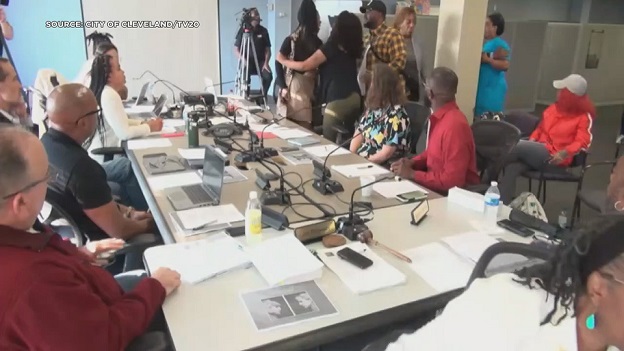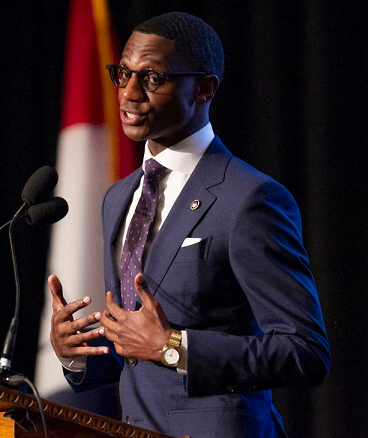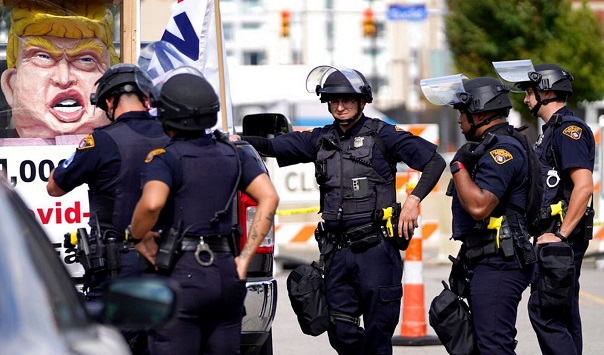Mayor Bibb Rejects Community Police Commission’s Choice For Executive Director!
FEATURED PHOTO: JASON GOODRICK INTERIM EXECUTIVE DIRECTOR CLEVELAND COMMUNITY POLICE COMMISSION

SignalCleveland.org, By Stephanie Casanova, Posted August 28th 2023
Mayor Justin Bibb last month rejected the Cleveland Community Police Commission’s nomination of Jason Goodrick as executive director.
Goodrick has been the interim executive director for the new commission since January and has been the executive director for past community police commissions.
“Under Mr. Goodrick’s tenure as Interim Executive Director, there has been significant internal conflict, a loss of confidence, and insufficient progress,” Bibb wrote in a letter to the commissioners Thursday. “This is not the fresh start voters envisioned.”
The mayor’s letter said the process that led to the commission’s decision to nominate Goodrick was not transparent and did not include community input.
Mayor Bibb encouraged commission members to follow through with what they had initially said would be a transparent and inclusive process to hire an executive director. He requested that the commission suggest two or three new nominees.
In 2021, voters approved a charter amendment known as Issue 24, which created the new Community Police Commission that has final say on police discipline cases and officer policies. It marks a significant change in how police in Cleveland are disciplined, giving it more power than previous community police commissions.

The new amendment says the executive director is nominated by the commission and appointed by the mayor.
In an email to Signal Cleveland, Goodrick said he is taking time to process the letter and consider his options.
“I appreciate the many calls and texts from community members and colleagues who are in support of my nomination and my work,” Goodrick wrote.
Commissioner John Adams said he agrees with the mayor’s decision. Adams voted against nominating Goodrick in the June 14 meeting. He said he was hoping for a more transparent and open hiring process.
“I think this is the right thing to do,” he said. “I think we should open the position up and we should get the best person for Cleveland because that’s what we need. This is a really big job. It requires a lot of work.”
He said it’s possible Goodrick is the best person for the job. Goodrick has been helpful as the interim director with getting the commission started and stepping in to answer questions and resolve issues as he and other commissioners reach out for assistance, Adams said.
“I think Jason has real value,” he said. “But just because he has real value doesn’t mean that we should not go through a process.”
Commissioner Piet van Lier said he voted to nominate Goodrick to the permanent position because his experience and knowledge would help move the commission’s work forward. A search for an executive director will take time, stretching commissioners thin with all the other work on their plate, van Lier said.
Almost 60% of voters approved Issue 24, “and we owe it to them to focus on the critical work of ensuring that everyone in Cleveland, no matter where they live or what they look like, is safe and truly protected,” van Lier told Signal Cleveland.
“That said, I understand the concerns about the process that brought us to this place, and I hope we can find a way forward that will allow the commission to do the work it needs to do.”

Delante Thomas, chief ethics officer for the City of Cleveland, told Signal Cleveland that the Mayor Bibb’s primary concern is that the commission didn’t follow an open and transparent process.
The commission’s vote on whether to nominate Goodrick was divisive – a 7-5 vote at their June 14 meeting. That meeting was derailed by commissioners arguing among themselves and with residents during the meeting.The meeting included moments where people yelled over one another.
Thomas said the commission’s co-chairs notified the mayor’s office of their decision to nominate Goodrick within a day of that meeting. That email didn’t include any supporting documentation or information about how they reached that decision, Thomas said.
“It’s important that this commission lay a strong foundation because this sets the tone for future commissions and something that will outlast and outlive all of us,” Thomas said. “So we want to make sure that we do this right.”
Criminal Justice Reporter (she/her)
Stephanie, who covered criminal justice and breaking news at the Chicago Tribune, is a bilingual journalist with a passion for storytelling that is inclusive and reflects the diversity of the communities she covers. She has been a reporter and copy editor for local newspapers in South Dakota, Kansas and Arizona. Stephanie is also a Maynard 200 alumni, a Maynard Institute for Journalism Education training program for journalists of color that focuses on making newsrooms more equitable, diverse and anti-racist.








